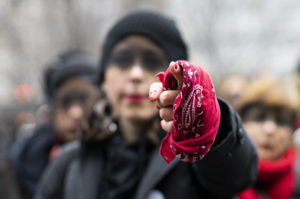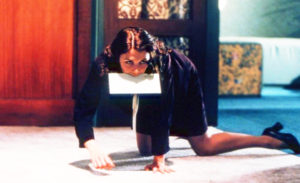Even in the colourful environs of New Orleans, Stephen Elliott’s car stood out: a bright pink Honda hatchback with a panda motif on the doors and hood. But on a January morning in 2019, people who walked past the vehicle were doing double takes for a different reason: a single word had been painted in huge, straggly black letters on the hood, doors and rear hatch: “Rapist”.
To Elliott, this incident didn’t come as a complete surprise: it was the second time his property had been subjected to vandalism in three months. In October of the previous year, someone had sprayed the word “SCUM” across the facade of his house.
In both cases, the perpetrator’s identity was a mystery, but his or her motivations were not. Elliott had been accused of rape in 2017, in an entry on the now-notorious Shitty Media Men list — a Google document of crowd-sourced, anonymous allegations of bad behaviour. The apparent crimes were usually (but not always) sexual. The list triggered investigations into the conduct of various male professionals in the media world, including The Atlantic’s Leon Wieseltier, who was fired afterwards, and The Paris Review’s Lorin Stein, who resigned. Elliott, who in addition to the rape allegation was accused of sexual harassment, coercion, and unsolicited invitations to his apartment, says that his agent dropped him after he was named, and that friends and professional opportunities alike suddenly disappeared. At the time the list emerged he had been hoping to launch a career as a screenwriter (his memoir, The Adderall Diaries, had been recently made into a film starring James Franco). His move to New Orleans came after he concluded that this was no longer possible, that he needed a fresh start.
Elliott isn’t the only man to maintain that the allegations against him are false. “I didn’t do what I’m accused of on the list. But obviously I wronged somebody to the point that they want to mess with my life,” one anonymous man told The Cut in 2018. But in a world where the accused talk about quietly moving on from the list as an act of feminist solidarity — in that man’s words, “taking one for the team” — Elliott is alone in his relentless desire to clear his name.
One of his earliest attempts came in the form of an essay in Quillette titled “How An Anonymous Accusation Derailed My Life”, which was published in September 2018. The response was heated. But it was the lawsuit he filed a year later, just before the statute of limitations for such a case expired, that caused the biggest uproar — maybe even more so than the list itself. “Stephen Elliott Continues to Be a Shitty Media Man,” read one representative headline. It was not the alleged rape, but the news that he was suing the list’s creator, Moira Donegan, for defamation, that triggered the vandalism to Elliott’s home and car.
Elliott reported those incidents to the police, a fact he tells me he recently shared with Lila Shapiro, a journalist from New York Magazine who was writing a five-year retrospective on all things Shitty Media Man. But when that story was published last week, there was no mention of the vandalism. Rather than bringing readers up-to-date, the story dwelled deeply on the circumstances surrounding the original creation of the list — and in Elliott’s case, assembled prior reporting, previously published accounts, and testimonials from his former friends and colleagues to paint a picture of him as a man with a long, fraught history of overfamiliar, boundary-challenging behaviour.
Elliott was the kind of colleague who would hold your hand, climb into your lap, overshare about his sex life and ask impertinent questions about yours, oblivious to how uncomfortable he was making you. He doesn’t dispute this — “I can be needy, I can be clingy,” he tells me, though he believes that there’s some context missing: “The cues I misread were more like, I thought we were friends. It’s never a sexual situation.” But this is the thrust of the piece, more or less: in choosing to focus on Elliott’s personality, his way of moving through the world, it suggests that we can elide the problem of his having been accused of a crime that not even his fiercest detractors actually seem to believe he committed.
Full disclosure: Elliott and I have several friends in common, and my husband and I met him once for a drink near his home in New Orleans when we were there in 2019. I found him appealingly guileless, but I also did not struggle to understand why some people don’t; Elliott is notoriously open about the topics most people keep under wraps, and it’s not hard to see how that frank vulnerability could seem, or be, manipulative under the proper circumstances. (The New York Magazine piece includes a quote from memoirist Elissa Bassist, who describes failing to set firm boundaries with Elliott because “I was so afraid of hurting his delicate feelings”.) Even his defence against the allegation that he raped someone is kind of a kinky overshare: where other men on the list described racking their brains to figure out which sexual encounter might have spawned the accusation, which woman had come to see what happened as nonconsensual, Elliott says he has no such back catalogue of encounters to pore over because he doesn’t have penetrative sex with women.
That, he tells me, is what makes the framing of this story so frustrating. A woman who felt uncomfortable about Elliott’s over-familiar behaviour “has a right to her interpretation. What you feel about what happened, it’s not invalid. It’s not really objective,” he says. “What is objective is rape.”
But this is what’s so strange about this case: not that Elliott’s sexual history makes the rape allegation implausible, but that nobody seems to care. Hence the focus on his documented history of making women uncomfortable, which is supposed to be understood as different in degree but not in kind from the felony of which he’d been accused. No charges were ever brought against him, and no other women alleging rape or even sexual misconduct ever came forward, anonymously or otherwise. As novelist Claire Vay Watkins said: “Stephen Elliott did not rape me, did not attempt to rape me. I am not anywhere close to implying that he did. I am saying a sexist negation, a refusal to acknowledge a female writer as a writer, as a peer, as a person, is of a piece with sexual entitlement.” It’s a neat rhetorical trick: in one breath, Watkins emphatically does not accuse Elliott of raping her, while also emphatically suggesting that he’s the type of guy who would.
The New York Magazine piece seems to confirm this with a previously unpublished and fairly shocking allegation from a woman identified as R.D., who said that when she walked into a writing class hosted by Elliott, he “stopped the class and dove at me and threw his face into my tits and started moaning”.
Elliott has been generally candid since his cancellation about when and how he’s crossed the line with women: yes, he was pushy about asking to sleep in women’s beds. Yes, he put his hands in people’s pockets. But this, he says, categorically did not happen — and he also says something else: “Does that even sound plausible to you?”
He has a point: the story is outrageous. But not only that, it’s the one testimonial against Elliott that genuinely supports the conflation of a creepy person with a rapey one. Amid multiple reports of Elliott wheedling and whining to sleep in women’s beds (but then relenting, albeit poutingly, when told no), here was a legitimate instance of nonconsensual sexual contact, an incident that seemed to truly bridge the gap between “boundary challenged” and “violent felony committed”.
In other MeToo stories, this is where you would often see a quick journalistic aside: that another member of the class remembered witnessing this incident, or that R.D. told a friend about it at the time. Corroboration lends credibility, especially when the accused flatly denies it. But the this story contains no such note, and here’s where things get weird: Elliott says that not only is this story false, but that the accuser (whose identity he learned during fact checking) is someone with whom he had a multi-year sexual relationship. He also says that the woman in question violated him by carving the word “owned” into one of his buttocks with a needle while he was tied up and either blindfolded or wearing a hood, he isn’t sure which. (A friend of Elliott’s from the BDSM scene confirmed to me that he told her about the ass-carving incident several years ago during a conversation about his experiences as a submissive. R.D. did not respond to a request for comment. Shapiro declined to answer questions about her reporting process via email.)
Of course, none of this is to say definitively that Elliott didn’t abruptly halt a writing class to molest a newly-arrived student, nor can we know for certain that said student later carved the word “owned” on Elliott’s rear end. The only thing clear from these conflicting accounts is that the truth, buried as it is in a miasma of old grudges, kinky sex, and a transformative reckoning with the norms that govern relationships between men and women, is extremely complicated. But this is what’s striking about the Shitty Media Men list — and to a certain extent, the coverage of it ever since: it not only eschews nuance, but displays a practiced incuriosity as to what the truth might be. And when questions arise as to the veracity of the list, or the fraught implications of making it, the response is to downplay its seriousness until it sounds less like a groundbreaking movement for social justice and more like something a bunch of girls did at a slumber party. “That first night? It was the most fun thing I’ve ever done in my life,” says one woman quoted in the New York Magazine piece.
Illuminated here is the fundamental tension at the heart of MeToo: it is very difficult to demand that sexual assault be taken seriously, but simultaneously insist that false allegations thereof are no big deal. At the peak of the movement, it was not unusual to hear that it was “worth it” for a few innocent men to be ruined for the sake of social progress. In Elliott’s case, there’s also a heavy element of victim blaming: a representative tweet from literary influencer Maris Kreisman expressed that it was “infuriating but also mildly fun to watch Stephen Elliott place blame on everyone but himself”, as though being falsely accused of a serious crime were simply the natural, even entertaining, outcome of having a difficult personality. And indeed, it’s hard to imagine any other criminal allegation being treated this way, with the accused expected to fall on the sword for the sake of the greater good, guilty or not.
There’s something about this that recalls the famous scene in the movie The Fugitive, where Richard Kimball, played by Harrison Ford, is cornered at the precipice of the Cheoah Dam. He turns, pleading, desperate: “I didn’t kill my wife,” he shouts.
His pursuer replies, “I don’t care.”
That’s when Kimball jumps, but it’s not the leap that’s shocking; it’s the apathy that precedes it. The notion that innocence doesn’t matter, that the truth doesn’t matter. Stephen Elliott isn’t accused of murder, but there are nevertheless echoes of that same apathy in the public exhortations — of critics, of former friends, even of fellow accused men — to just stop fighting, already. To accept the rape accusation as a fair cop for all the discomfort he might have caused. To “conduct yourself with grace in the court of life”, as one former colleague puts it, “rather than the court of law”.
But for whatever it gets him (and it’s not likely to be much), Elliott’s determination remains a thorn in the side of that satisfying narrative about women coming together to take down the bad men once and for all. The idea that there should be serious consequences for serious crimes — and by extension, serious repercussions in the event that an accusation is made falsely or frivolously — isn’t just alarming, but a buzzkill. The idea of wielding one’s power responsibly, and being held accountable when you don’t, is not part of the patriarchy-smashing vibe we’re trying to cultivate, here. And on this front, it’s impossible not to notice the role reversal, and the parallels, between this and how women have long suffered for reporting sexual harassment.
The Shitty Media Men list might have been the outrage du jour, but it wasn’t until Elliott filed his lawsuit that people really got angry. Why did he have to ruin the fun? Why couldn’t he just take a joke? Why, in the age of MeToo, are you taking accusations of sexual assault so seriously?
Disclaimer
Some of the posts we share are controversial and we do not necessarily agree with them in the whole extend. Sometimes we agree with the content or part of it but we do not agree with the narration or language. Nevertheless we find them somehow interesting, valuable and/or informative or we share them, because we strongly believe in freedom of speech, free press and journalism. We strongly encourage you to have a critical approach to all the content, do your own research and analysis to build your own opinion.
We would be glad to have your feedback.
Source: UnHerd Read the original article here: https://unherd.com/




